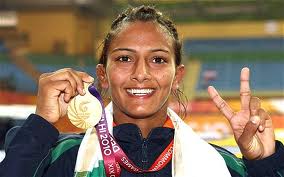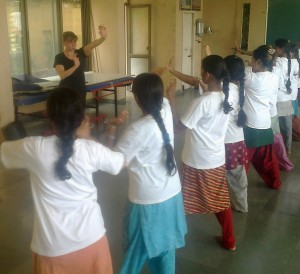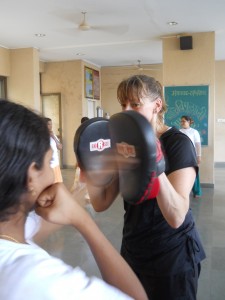I am always interested to read about females who go against stereotype and are successful. Today, I came across the story of two sisters who will, for the first time ever, represent India in the Olympics in wrestling. Things are changing. How cool is that?
Here is an article on the young ladies from the London Telegraph:
London 2012 Olympics: Phogat sisters are wrestling superstars in northern India
In the remote villages of north-west India, it is not cricket that stirs the passions, but wrestling.
(By Simon Briggs, in Haryana) Indian wrestling has changed little since the Greeks introduced their own version to the ancient Olympics, almost 3,000 years ago. Even today, it represents sport at its most primal.
The bouts are held on a patch of churned-up mud, and have the rhythm and solemnity of a religious ritual. First the apprentices loosen the soil with a shovel and level it out with their feet. Then the fighters arrive. Clad only in loincloths, they grab handfuls of earth and smear it over their bodies, to make their limbs slippery and difficult to grasp.
Now the grappling starts. Each fighter clutches the other and tries to knock him off balance. You win a bout by pinning the back of your opponents’ shoulders to the ground. Shouts and exhortations drift in from the crowd, who often gather 10 deep, using bullock-carts and rickshaws as impromptu stands.
The sport’s roots run so deep that you will find Hindu epics telling of Krishna’s great wrestling bouts with the evil king Kamsa. But underneath the surface, radical changes are under way. The women have arrived.
At last year’s Commonwealth Games in Delhi, a pair of female wrestlers from Haryana claimed medals. Geeta Phogat, who is now 22, won gold; her sister Babita, 20, took silver.
These young women were born in the village of Balali, home to a community of 2,000. They started wrestling when Geeta was 10, and by the time she was 12, they were travelling to neighbouring villages to “get all dirty with boys”, as The Times of India indelicately phrased it. More often than not, they won.
“We became quite famous in our district,” Geeta said. “People came especially to watch us. And I used to love it when we heard them saying, ‘There go the girls who beat boys’.”
The rise of the Phogat sisters is all the more remarkable when you consider the repressive gender politics of northern India. Statistically, Haryana is one of the country’s more affluent states, because of its proximity to Delhi. Yet it is also home to some of the country’s most primitive communities. Female infanticide is so common that, on average, there are just 86 women for every 100 men. In most villages, arranged marriages are the only marriages and women who step outside the system often pay with their lives.
Against this backdrop, Mahavir Singh Phogat, himself a former wrestler, chose to grapple with social convention. Chance played a hand here, for if Singh’s wife Daya had delivered him a son, he would surely have followed the established pattern of village life. He would have left the women to clean the house and milk the cattle in those precious cool hours after dawn, while he went down to the village gym – the akhara – with his boy.
But Mahavir had no son. So he created an akhara in his own house, digging a mud mat where he could train his daughters in the signature moves of kushti – the Hindi word for wrestling. He taught them the bridge, pin and takedown, carrying a stick to underline his authority.
“He was strict when we were training,” said Geeta. “Even when I was doing press-ups on the bricks, he used to get angry with me, saying he wanted me to do more hard work.
“Now Babita and I both have Commonwealth medals, but my father is not yet satisfied. He wants to see us win the Olympics in London. There are three other girls all younger than us in my family – one sister and two cousins – and my father says he can coach them until they reach the same level as us.”
If Mahavir remains stern in the face of his daughters’ success, then the surrounding district of Bhiwani is more easily impressed. When the Phogats returned home from Delhi, they were welcomed by a crowd of 20,000 well-wishers and a fortnight of celebrations.
“We were feted,” said Geeta, “It went on for 10 or 15 days, and people were inviting us to schools, so we could talk to the kids. We told them you can start anything as long as you work hard. Everyone should be allowed to participate in sport, because it helps you to become more confident. That is important for women in India, because we are not always treated as equals.”
There speaks the voice of experience. Today, the Phogat sisters are the toast of Balali, even to the point where their mother was elected as the village head. But their reception was not always so warm.
“Our grandmother used to say that girls should not wrestle,” recalled Geeta. “Some people didn’t even think we should be allowed out of the house. They would say it is a man’s game. They would say that when you wrestle your ears break and a girl should look beautiful so that she can get married.
“But since we won at the Commonwealths, views have changed. Now they say they would like their daughters to be like us. We are proud to be role models.”
And what of husbands? Already relatively old for single women in India, the Phogats say most of their classmates have been paired off. Yet neither shows much inclination to settle down.
“We do want to get married,” said Babita, “but not until we finish wrestling. Fortunately, everyone in our family understands.”
From backwoods to the big city
Three years ago, the Phogat sisters left Balali for the brighter lights of Patiala, a city of two million that stands 100 miles further north in the Punjab. The attraction was the national sports campus, which hosts India’s boxing, fencing and weightlifting teams, as well as a dozen wrestlers.
It is a very different life to the one the sisters once knew. They wrestle on cushioned mats rather than churned mud. They have cars, a black runabout for Babita and a grander silver saloon for Geeta. They study at the local university and receive generous funding from the Mittal Champions Trust, a sporting initiative bankrolled by the steel magnate Lakshmi Mittal and run by his son-in-law, Amit Bhatia.
This is a good time to be a trailblazer. India is developing faster than at any time since independence. Stories of female emancipation and class rebellion are everywhere, from the Booker Prize-winning novel White Tiger – which follows the fortunes of a low-caste millionaire – to the parliament of West Bengal, where the firebrand politician Mamata Bannerjee is chief minister.
“Wrestling is changing for the better,” says Sushila Devi, whose son Yogeshwar Dutt is the most decorated wrestler in Haryana. “We see girls training at the akhara now. They will get a good career if they reach the national standard.”
In Haryana, honorary police ranks are bestowed on high-achieving athletes. Geeta has been offered an inspector’s post, while Yogeshwar is already a detective superintendent. And anyone who doubts the benefits of a life in sport should stop in Yogeshwar’s village of Bhainswal, between Delhi and Patiala. The most famous sportsman in the state, he lives with his mother in a two-storey mansion that towers over the hovels of his neighbours. The front wall is decorated with the Olympic rings.
The Phogat sisters can look at Yogeshwar’s grand citadel and see where they might end up. And even if they stumble next summer, other Indian women are likely to swell their country’s feeble tally of 20 Olympic medals. At last year’s Commonwealth Games, over half of India’s 101 medals went to women.
“It is said in India that if your family is hostile, women can end up dead,” explains Prof Ruth Vanita, an authority on gender politics in Haryana. “But if your family backs you, there is nowhere a girl cannot go.”
And that includes the podium in Stratford’s Olympic Park.









